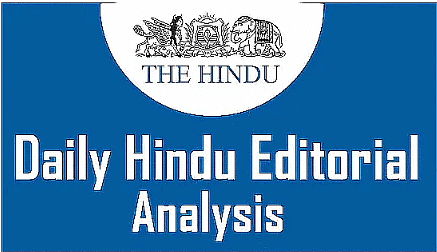UPSC Exam > UPSC Notes > Current Affairs & Hindu Analysis: Daily, Weekly & Monthly > The Hindu Editorial Analysis- 14th October 2023
The Hindu Editorial Analysis- 14th October 2023 | Current Affairs & Hindu Analysis: Daily, Weekly & Monthly - UPSC PDF Download

Balancing policy
Why in News?
- The recent attack by Hamas (Arab sponsored Jihadist outfit) on Israel has prompted PM Modi to express solidarity with Israel, highlighting the complex nature of India’s relations with both Israel and Palestine.
- Over the past seven decades, India’s stance on these nations has undergone significant shifts, reflecting its evolving foreign policy priorities and diplomatic considerations.
About Israel-Palestine Conflict
- Historical Background: The land of contention was under the Ottoman Empire and later the British Empire.
- Anti-Semitism as Official Policy: Several Islamic countries, including the Arab world, Turkiye and Pakistan, have officially expressed hatred against Jews citing reference to religious scriptures.
- Denial of Access: Jews, as a micro-minority of the world, have been denied access to their historic homeland.
- Arab Resistance: Arabs resisted, claiming the land as their own, known as Palestine at the time.
- Balfour Declaration: In 1917, the United Kingdom expressed support for the establishment of a Jewish homeland in Palestine.
- Violent Resistance: Arab resistance to the declaration led to violence and further tensions.
India’s quest for Balancing Relations
India’s Post-Independence Stance
- Nehru and Gandhi’s Stand: Post-independence, India was staunchly pro-Palestine as Jawaharlal Nehru and Mahatma Gandhi opposed religious exclusivity and supported the Palestinian cause.
- UN Votes: India voted against the partition of Palestine and Israel’s admission to the UN but recognized Israel in 1950 after Turkey and Iran did so.
Era of Indira and Rajiv Gandhi
- Support for Palestine: During Indira Gandhi’s rule, India continued its support for the Palestinian struggle, elevating the PLO to the sole legitimate representative of Palestine.
- Solidarity and Diplomacy: Strong ties were forged with Yasser Arafat, and India hosted the NAM summit in 1983, emphasizing solidarity with Palestine.
Changing Dynamics
- Critics and Shifts: Critics within India raised concerns about its pro-Arab stance, given Arab countries’ neutrality during India’s wars with China and Pakistan.
- Indian-Israeli Relations: India recognized Israel in 1992, establishing full diplomatic relations after the end of the Cold War and BJP’s rise to power.
- Kargil Conflict: During the Kargil conflict in 1999, Israel provided crucial military support, strengthening bilateral ties.
Recent Developments
- PM Modi’s Approach: Prime Minister Modi’s approach has balanced India’s ties with Israel and Palestine. He visited Israel in 2017, signaling a shift in focus.
- De-hyphenation: Modi achieved a de-hyphenation of the relationship by separately visiting Palestine in 2018.
- Wider Regional Engagement: India has deepened ties with Israel and West Asian nations like Saudi Arabia, Egypt, Qatar, and Iran over the past decade.
Current Dilemma
- Diplomatic Tight Spot: Recent hostilities in the region have placed India in a diplomatic dilemma. The conflict tests India’s relations with Israel and Palestine against the backdrop of the Abraham Accords and shifting Middle East dynamics.
- Dividends at Stake: India had hoped to benefit from the newfound peace in the region, given its significant diaspora, connectivity, and energy imports from West Asia.
Conclusion
- India’s relationship with Israel and Palestine has evolved significantly since independence, influenced by domestic politics, global shifts, and regional considerations.
- While India continues to support the Palestinian cause, it has also strengthened its strategic ties with Israel.
- The recent escalation in hostilities in the region poses challenges for India’s diplomatic balancing act and its aspirations in the Middle East.
The document The Hindu Editorial Analysis- 14th October 2023 | Current Affairs & Hindu Analysis: Daily, Weekly & Monthly - UPSC is a part of the UPSC Course Current Affairs & Hindu Analysis: Daily, Weekly & Monthly.
All you need of UPSC at this link: UPSC
|
63 videos|5408 docs|1146 tests
|
Related Searches




















